
There are two big things to note with the launch of AWS Connect.
First, it’s just another example of how aggressive Amazon can be when it breaks into new markets. There are lots of call center software companies out there, some of which require expensive switchboard hardware to get started. AWS Connect is a price-competitive alternative that also offers customers the ability to set up Alexa-style voice menus.
The other thing is that, at first blush, AWS Connect looks like it could compete with customer service products from Salesforce, the $ 58 billion enterprise software company that’s become Amazon’s BFF after its relationship with Microsoft fell apart.
But the two companies are using it to highlight just how tight their bonds have become, with Salesforce actually integrating with AWS Connect today.
“I’m spending probably too much time in Seattle,” where Amazon is based, jokes San Francisco-based Salesforce Executive VP of Strategic Alliances Ryan Aytay.
‘CEO-to-CEO relationship’
Aytay says that the company’s ties with Amazon go all the way to the top, calling it a “CEO-to-CEO relationship” between Salesforce CEO Marc Benioff and Amazon Web Services CEO Andy Jassy.
Amazon is a big customer of Salesforce’s own customer relationship management (CRM) software, says Aytay. Conversely, he says, Salesforce hosts “many, many” chunks of its own business, including the Heroku app hosting service, with Amazon Web Services.
Beyond that, Aytay says, the companies have committed to integrating their products in smart ways. In fact, Aytay says, Amazon and Salesforce are keeping the other briefed on their product roadmaps, the better to plan how they can work together and bring data from one to the other.
“We have a lot of data, they have a lot of data, they want to connect it to their CRM,” says Aytay.
Amazon has a lot of strengths in infrastructure and technology, says Aytay, and Salesforce’s whole deal is around tracking customer behavior and contact across apps and services. In that light, the AWS Connect service isn’t so much a competitor as it is a “complementary” new way to feed data back into Salesforce.
As for Microsoft, which Salesforce had been cozying up to before the LinkedIn acquisition drove a wedge between them, Aytay is a little more muted. He says that they’re still working together, and that Salesforce and Microsoft integrations will still be offered, “as need be, based on customer demand.”
NOW WATCH: Amazon is launching a drive-up grocery service — here’s how it works

